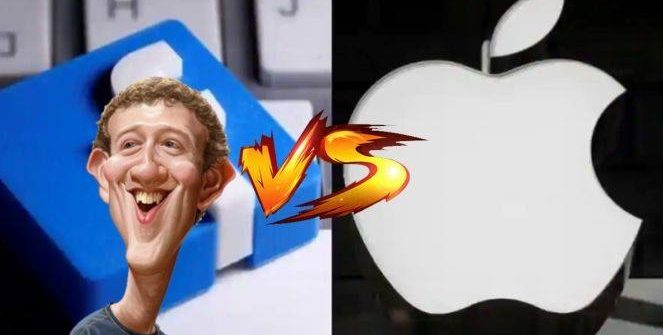OPINION – First Fortnite, now Facebook – Apple’s store gets another slap in the face as Facebook launches a new tool for smaller businesses. This entertainment revolution began with Epic Games attempting to circumvent Apple’s commission system, for which they removed Epic’s hit game, Fortnite, from their store. Epic Games responded with a rebellious video before Google took the stuff from its own app store too. Now that three tech giants are at each other’s throats, Facebook has also chosen to rebel against Apple, which Epic considers the new “Big Brother”: it has attacked the company with a tool developed for small businesses that allow us to hold paid online events in order to promote ourselves. (Paid Online Events)
First, let’s stay objective: we’re talking about companies here. They may try to give them a face and an identity taken from here and there, but they are only “persons” in a legal sense – we’re actually talking about profit-oriented, artificially formed monsters. Now that we’ve clarified this and explained what the “crusade” and “revolution” mentioned above really meant, let’s look at the latest player in the inter-firm game.
The social media giant, which leaves virtually no smaller company to succeed, only if it transfers it’s content/data through Facebook’s not-too-easy-to-trust interface is now hypocritically poses as a protector of smaller companies, who pay a 30% commission to Apple over their services and in-app microtransaction.
The bang with Facebook happened a day after Epic Games, still a popular player, Fortnite developer-publisher, had already sued Apple for its anti-competitive behaviour.
The attack began with the launch of a new tool for smaller companies that could make online events chargeable such as lessons or even wine tastings. For now, Facebook is generously refraining from taking a share of the revenue it earns, saying the coronavirus has seriously affected smaller businesses. (Of course, if companies and users get used to this, it will be time to pay up to Zuckerberg and company…)
The misfortune on Facebook began when Apple indicated it would not contribute to circumventing the 30% commission on its devices, so 30% of the money spent on iOS with every Facebook app would still land in Apple’s pocket.
Google has stated that it will allow the tool to generate revenue on its platform without imposing similar payment obligations on Facebook.
“We asked Apple to reduce its 30% App Store tax or allow us to offer Facebook Pay so we could absorb all costs for businesses struggling during COVID-19. Unfortunately, they dismissed both our requests and SMBs will only be paid 70% of their hard-earned revenue,” – regretted Fiji Simo, head of the Facebook App in a blog post where he also announced the new features.
There was no Apple spokesperson who responded immediately to the request to comment on the events.
Apple, which has grown from a rebellious company, sworn enemy of IBM into a brutal corporate giant over the years, has been criticized for years for taking its toll on smaller companies’ revenues, but antitrust investigations in the U.S. and Europe have made all this a particularly sensitive topic for the iPhone manufacturing company.
Until Thursday, however, these battles took place between Apple and much smaller companies, the big boys just got into the party… Up to this point, music provider Spotify was the biggest company to face Apple. And now, right against Apple is one of the largest video game manufacturers in the world right now, and Facebook, one of the tech companies that is comparable in size and resources to the huge company with the bitten apple logo.
Developers have long criticized Apple and Google for enforcing the payment of more than 30% commission, with which they ensure their place on the platforms of the two mega-companies.
Fortnite seems to have outgrown the virtual world and is now attacking companies straight away. Specifically Google and Apple.
The developers’ primary complaint was the mere fact that Apple and Google may have grown to the point where they already impose a separate “tax” on the intellectual property they sell, which they then use to push their own assets, effectively with their competitors’ money.
“The problem here isn’t whether 30 percent or 15 percent is ‘fair,’ but that there is no store or payments-based competition on Apple devices,” said Matthew Ball, a media strategist and former global head of strategy at Amazon Studios.
“This means the rates Apple sets, and the policies they enforce, are not determined by the market, but instead just by Apple — one of the most powerful companies in history,” – He said.
This week, Epic Games became the first company to step up because of the move, and to do it because of something else than money, seemingly. It was against the monopoly which Apple and Google hold I thought. I, the author of this article, also found this commendable. However, the appearance of Facebook in this conflict has awakened me from the dream world like a cold shower: these are nothing more than soulless, profit-seeking multinational giants. In any case, it’s interesting that Epic, which I think runs a disgusting trend of taking the money of children through their expensive and super-addictive Fortnite microtransactions, was the initiator of this apparent revolution, a company from the video game industry. It also shows how dangerous and influential this industry has become.
Epic, though immediately sued to Apple after they took down Fortnite, interestingly enough didn’t go to Google, which does the same thing, maybe just not as brutally as Apple.
Friday’s attack was also of individual significance to Facebook:
For nearly a decade, the two Silicon Valley corporate giants have been fighting each other for their attitudes toward different corporate policies. Apple’s board of directors, for example, with Steve Jobs and current president Tim Cook at the forefront, has often criticized Facebook for misusing user data.
Mark Zuckerberg, the face and president of Facebook, and other Facebook executives have repeatedly patted themselves on the shoulder in public for keeping their services free even for companies. How it is, in reality, could be told at length, still, let’s not look at the clash of these companies and see any more than what is in it: everyone here plays the role of the good guy while the only thing they’re interested in is money, especially Facebook, which while making it impossible to feel free to post my own intellectual product, which I am creating on the site of this business, yes, I mean theGeek, presents itself unblushingly as a friend of small people and small businesses.
How do you know that Mark Zuckerberg is lying? He opens his mouth…
-Praesagus-
Source: NBCNews.com
Please support our page theGeek.games on Patreon, so we can continue to write you the latest gaming, movie and tech news and reviews as an independent magazine.
Become a Patron!
















Leave a Reply